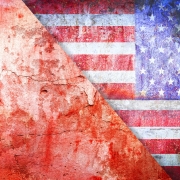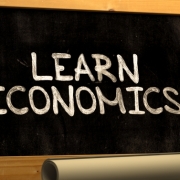The Innovations Entrepreneurs Discover Depend On The Questions They Ask.
It is in the interests of some humans to disparage the intelligence and capabilities of others. The most salient instance of this phenomenon is government: politicians and bureaucrats think the rest of us can’t get out of our own way and can’t get along without their help.
Another version of this disdain is to be found in intellectuals and scientists. They think the rest of us are dumb. They capture their arrogant disdain in fancy terminology like “bounded rationality”, by which they mean our ability to think clearly is highly constrained. But sometimes they slip, and let their unguarded language express their true superciliousness. Nobel laureate Daniel Kahneman, for example, tells us we are “blind to the obvious”, and suggested we “replace humans with algorithms wherever possible”. He thinks robots exhibit far more wisdom than humans.
Every Individual Mind Processes The World In Its Own Way.
Teppo Felin is an academic researcher who does not share this point of view, and wants to give the poor, dumb rest of us a break. He takes a more positive view of our capabilities for cognition, and finds the brilliant, value creating way we apply it in entrepreneurship.
Felin points out that the “humans are dumb” crowd base their analysis on what they believe is a limited ability of the human mind to process data. There is a lot of information in the world, and humans don’t always see it or detect it. For example, a lot of people undoubtedly observed apples falling from trees, but until Newton came along, no-one had processed these observations into the theory of gravitation. The data was there, but the pre-Newton humans didn’t “see” it. Hence, blind to the obvious. Felin calls this way of thinking about perception a “world-to-mind “ bias. There’s a lot of data the world presents to our minds and we are remiss in not seeing it all and processing it all.
However, he believes that this “world-to-mind” process is exactly the reverse of the one that actually applies, and the one that makes humans so creative. The real process is “mind-to-world”. Individuals make choices about what they are looking for in the information they receive from the world, and these choices determine what they see and what they discover. The choices are entirely subjective, and are therefore individualistic. Each one of us is discovering new things on the basis of the questions we ask, and each one of us has a unique capacity for discovery. The world doesn’t tell us what is relevant. Instead, it responds to questions. The more distinctive and individualized the questions, the more the potential for each one of us to find unique answers and novel strategies and contribute them to the social learning that drives progress.
Entrepreneurs Are Individuals Who Imagine The Future.
Felin joins the dots from the individual’s capacity to ask creative and generative questions, to the ability of entrepreneurs to imagine the future. Ironically, he thereby answers a question that our intellectual superiors ask and fail to answer: if human beings are so dumb and so constrained in their thinking and so blind, how do they generate the incredible improvement in prosperity and quality of life that we have witnessed over the last few generations? Deirdre McCloskey has estimated the scale of the improvement at 3000% over 200 years.
Felin finds the answer to these questions in entrepreneurship. Entrepreneurs are people who can imagine a better future, for themselves and the people they serve. How do they imagine the future? They ask original and creative questions. How can there be a hand-held computing device that’s intuitive to use without buttons and dials? (Steve Jobs.) What if life online were just like a college dorm? (Mark Zuckerberg?) What if the importance of a web page could be measured by the number of links to other popular web pages? (Sergey Brin and Larry Page.) What would it take to enable people to deliver packages overnight from and to anywhere in the country? (Fred Smith.) What are the implications of the continuous increases in the number of transistors that can be squeezed onto a computer chip? (Gordon Moore.) What if we could harness the power of steam to some sort of engine? (Thomas Newcomen.) What if that engine could power some kind of transportation? (Robert Stephenson.) What if I were to develop a service to help people with the tending of their yards? (Landscaping services all over the world.)
From this ability to ask original, creative questions about an unknown future, Felin’s proposition is that entrepreneurs become theorists. Their second step, after the question, is to develop a theory of how this imaginary future can be made to come about. Felin coins a term for this process through which novel beliefs about future possibilities and strategies emerge: “entrepreneurial theorizing”. Entrepreneurs are individuals with novel theories about the future.
These theories can’t come from knowledge, observation or experience. There may be some fragments of which the entrepreneur is aware or has observed in the marketplace, but, by definition, a theory is a guess that’s not based on existing data.
Entrepreneurial Theorizing Is Something We Can All Do.
Theorizing is not something limited to intellectuals and geniuses and Ph.D. scientists. In fact, Felin tells us, it’s quite childlike. It’s how children learn language, for example. They hear fragments and bits and pieces that they can’t fully recognize, and they must develop a theory of language (although, of course, they wouldn’t call it that) and then test the implications of that theory to see if it works, constantly adjusting on the basis of feedback. Entrepreneurs follow a similar process.
Psychologists tell us that this theorizing, or imagining the future, takes place separately from both the senses and perception. That’s why entrepreneurial theorizing does not require past or current observations and perceptions. It’s not the mere processing of existing data. It’s not analytical (that’s what machines do). It’s uniquely creative. It’s an act of “supposing, conceiving and considering various new possibilities (and impossibilities for that matter)”. (Emphasis original.) Imagination allows for completely new thoughts and completely new imagined scenarios, and permits envisioning an entirely new future. It’s brilliant. And we are all capable of this brilliance.
Brilliant imagination is brought to market by recombining resources in new ways. Entrepreneurs develop theories of how this can be done and set about the task of realizing their imagined scenario. Entrepreneurial theorizing never rests and never stops, from the original question (What if?) to the new innovation, which, itself, comes with more questions. How do you like it? How can I make it better?
We can all be entrepreneurs. It depends on the questions we ask and the theories we develop as a result.













